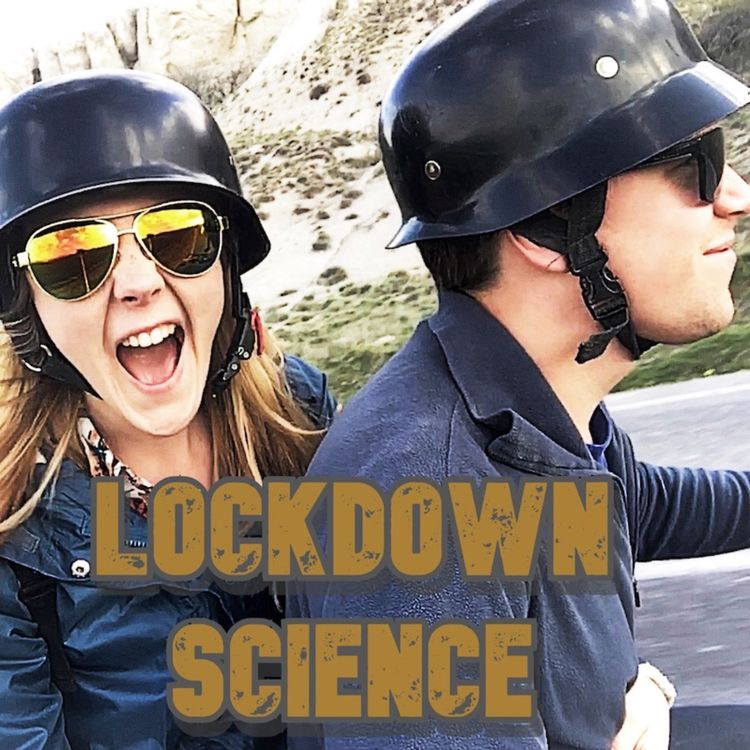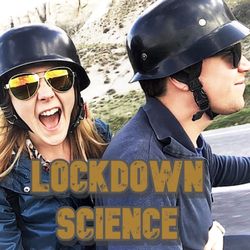Share

Lockdown Science
The Most Extreme Detox
This week we’re finding out whether the magnetic poles flipping killed the Neanderthals, asking how a bird species could hide for 170 years, marvelling at a swarm of tiny robot bees, wondering how two species of sea slugs manage to lose their heads but keep their cool, having a disco party with some glowing sharks, and wishing a very Happy Mother’s Day to the world’s oldest bird mum.
If you find some fun science that you think deserves its place on the show, we'd love to hear from you! Get in touch with us at lockdownsciencepodcast@gmail.com and follow us on @LockdownScience on Twitter and @LockdownSciencePodcast on Instagram.
Bioluminescent sharks:
Mallefet et al. (2021): https://doi.org/10.3389/fmars.2021.633582
Insect drones:
YuFeng Chen et al. (2021): https://doi.org/10.1109/TRO.2021.3053647 & video: https://news.mit.edu/2021/researchers-introduce-new-generation-tiny-agile-drones-0302
Black-browed babbler:
Akbar et al. (2020): https://static1.squarespace.com/static/5c1a9e03f407b482a158da87/t/6034c09a3440914018d3c306/1614071211606/Black-browed-Babbler.pdf
Adams Transitional Geomagnetic Event:
Cooper, Turney et al. (2021): https://doi.org/10.1126/science.abb8677
Autotomising sea slugs:
Mitoh and Yusa (2021): https://doi.org/10.1016/j.cub.2021.01.014
The Brilliant Abyss:
Helen Scales: https://www.bloomsbury.com/uk/the-brilliant-abyss-9781472966865/
Us and STEMM:
https://podcasts.apple.com/gb/podcast/us-and-stemm/id1547268807
Music credit: Blippy Trance Kevin MacLeod (incompetech.com)
Licensed under Creative Commons: By Attribution 3.0 License
http://creativecommons.org/licenses/by/3.0/
More episodes
View all episodes

13. Football Lads of the Sea
56:39||Season 2, Ep. 13In the last episode of this series, we’re taking tips on Instagram fame from the bird world, finding out about the history of Antarctica from a small green rock, getting sticky with some bacterial nets, traumatising bilbies for the sake of conservation, splashing down with a historic space mission, and deciding whether dolphins deserve their good reputation.If you find some fun science that you think deserves its place on the show, we'd love to hear from you! Get in touch with us at lockdownsciencepodcast@gmail.com and follow us on @LockdownScience on Twitter and @LockdownSciencePodcast on Instagram.King et al. (2021): https://doi.org/10.1038/s41467-021-22668-1 Moseby et al. (2012): https://doi.org/10.1016/j.anbehav.2012.01.023Siddoway et al. (2021): https://doi.org/10.5194/egusphere-egu21-9151Thömmes and Hayn-Leichsenring (2021): https://doi.org/10.1177/20416695211003585 Pint of Science: https://pintofscience.co.uk/pint21Climate change and conservation after the COVID-19 pandemic: what’s next?: https://pintofscience.co.uk/event/climate-change-and-conservation-after-the-covid-19-pandemic Music credit: Blippy Trance Kevin MacLeod (incompetech.com)Licensed under Creative Commons: By Attribution 3.0 Licensehttp://creativecommons.org/licenses/by/3.0/
12. Parachuting Beavers
53:45||Season 2, Ep. 12This week we’re finding out whether our morning espresso is safe from climate change, getting acquainted with a droopy creature that enjoys a cold bath, being dazzled by some high-tech paint, hearing about Geronimo the hero beaver, asking what monkeys can tell us about making friends after the pandemic, and trying not to yawn along with a pride of lions.If you find some fun science that you think deserves its place on the show, we'd love to hear from you! Get in touch with us at lockdownsciencepodcast@gmail.com and follow us on @LockdownScience on Twitter and @LockdownSciencePodcast on Instagram.Casetta et al. (2021): https://doi.org/10.1016/j.anbehav.2021.02.010Heter et al (1950): https://doi.org/10.2307/3796322(and a video of the parachuting beavers): https://www.youtube.com/watch?v=rrOE-m7sX9E Li et al. (2021): https://doi.org/10.1021/acsami.1c02368Plumptre et al. (2021): https://doi.org/10.3389/ffgc.2021.626635Testard et al. (2021): https://doi.org/10.1016/j.cub.2021.03.029 Music credit: Blippy Trance Kevin MacLeod (incompetech.com)Licensed under Creative Commons: By Attribution 3.0 Licensehttp://creativecommons.org/licenses/by/3.0/
11. The One That Causes Fear
51:43||Season 2, Ep. 11This week we’re asking whether octopuses dream of punching fish, finding out how the Amazon rainforest was born, wondering whether we’re heading for a fiery asteroid-generated doom, learning about how major corporations are turning their backs on deep-sea mining, slipping between the pages of an ancient book to find a butterfly, working out what an April fool can tell us about ecological modelling, and getting acquainted with a fearsome new dinosaur.If you find some fun science that you think deserves its place on the show, we'd love to hear from you! Get in touch with us at lockdownsciencepodcast@gmail.com and follow us on @LockdownScience on Twitter and @LockdownSciencePodcast on Instagram.Brunk et al. (2021): https://doi.org/10.1016/j.biocon.2021.109081Carvalho et al. (2021): https://doi.org/10.1126/science.abf1969Gianechini et al. (2021): https://doi.org/10.1080/02724634.2020.1877151de Souza Medeiros et al. (2021): https://doi.org/10.1016/j.isci.2021.102223 Warren et al. (2021): https://doi.org/10.1111/2041-210X.13591 Matt Hayes’ guide for iRecord: https://www.youtube.com/watch?v=iFbLiPV2UaYMusic credit: Blippy Trance Kevin MacLeod (incompetech.com)Licensed under Creative Commons: By Attribution 3.0 Licensehttp://creativecommons.org/licenses/by/3.0/
10. Stinkin' Jim
54:19||Season 2, Ep. 10This week we’re finding out how the moon is powering cars in the Shetlands, asking if cats value kindness, investigating whether a sperm-filled solar-powered lunar ark is viable, wondering whether sleepiness is to blame for a walrus on the Welsh coast, and learning some social skills from a very sneaky beetle.If you find some fun science that you think deserves its place on the show, we'd love to hear from you! Get in touch with us at lockdownsciencepodcast@gmail.com and follow us on @LockdownScience on Twitter and @LockdownSciencePodcast on Instagram.Journal ClubChijiiwa et al (2021): https://doi.org/10.26451/abc.08.01.03.2021 von Beeren and Tishechkin (2017): https://doi.org/10.1186/s40850-016-0010-x Isolation Recommendationswww.festival.cam.ac.uk/events/battle-beastswww.earthoptimism.cambridgeconservation.org Music credit: Blippy Trance Kevin MacLeod (incompetech.com)Licensed under Creative Commons: By Attribution 3.0 Licensehttp://creativecommons.org/licenses/by/3.0/
8. A Proper Funnel-head
55:05||Season 2, Ep. 8This week we’re asking what a sarcastic fringehead is, nerding out about Perseverance’s flashy gadgets, finding out how much tyrannical power a naked mole-rat queen has, cooing over an adorable clone, checking if thylacines are back from the dead, and marvelling at Europe’s most active volcano blowing its load.If you find some fun science that you think deserves its place on the show, we'd love to hear from you! Get in touch with us at lockdownsciencepodcast@gmail.com and follow us on @LockdownScience on Twitter and @LockdownSciencePodcast on Instagram.Barker et al. (2021): https://doi.org/10.1126/science.abc6588 Yorzinski (2020): https://doi.org/10.1098/rsbl.2020.0786Know Your Pollinators: https://op.europa.eu/en/publication-detail/-/publication/f229629c-c0c5-11ea-855a-01aa75ed71a1#Music credit: Blippy Trance Kevin MacLeod (incompetech.com)Licensed under Creative Commons: By Attribution 3.0 Licensehttp://creativecommons.org/licenses/by/3.0/
7. One Heck of a Spicy Bath
58:52||Season 2, Ep. 7This week we’re asking whether science can solve one of the world’s greatest conspiracy theories, checking if groundhogs can live forever, delving into Greek myths to find out more about butterflies, being dazzled by a new shade of blue, electrifying ourselves with some genuinely stunning eel research, and finding out what the world’s tiniest chameleon’s rather large secret is.If you find some fun science that you think deserves its place on the show, we'd love to hear from you! Get in touch with us at lockdownsciencepodcast@gmail.com and follow us on @LockdownScience on Twitter and @LockdownSciencePodcast on Instagram.Bastos et al. (2021): https://doi.org/10.1002/ece3.7121 Gaume and Puzrin (2021): https://doi.org/10.1038/s43247-020-00081-8 Glaw et al. (2021): https://doi.org/10.1038/s41598-020-80955-1 O’Mara et al. (2021): https://doi.org/10.1016/j.cub.2020.12.042 Yang et al. (2021): https://doi.org/10.1039/D0SM01230KMusic credit: Blippy Trance Kevin MacLeod (incompetech.com)Licensed under Creative Commons: By Attribution 3.0 Licensehttp://creativecommons.org/licenses/by/3.0/
6. Monkey Economics
52:30||Season 2, Ep. 6This week we’re finding out how to make your Burns Night stellar, deciding whether we have what it takes to control a herd of bison, discovering what’s causing sci-fi blue jets visible from the ISS, asking whether Suki can recognise us from voice alone, and working out how much we now need to fear the criminal potential of macaques.If you find some fun science that you think deserves its place on the show, we'd love to hear from you! Get in touch with us at lockdownsciencepodcast@gmail.com!Brumm et al. (2021): https://doi.org/10.1126/sciadv.abd4648Leca et al. (2021): https://doi.org/10.1098/rstb.2019.0677 Neubert et al. (2021): https://doi.org/10.1038/s41586-020-03122-6Saito and Shinozuka (2013): https://doi.org/10.1007/s10071-013-0620-4 Simmons et al. (2021): http://digitallibrary.amnh.org/handle/2246/7249 Music credit: Blippy Trance Kevin MacLeod (incompetech.com)Licensed under Creative Commons: By Attribution 3.0 Licensehttp://creativecommons.org/licenses/by/3.0/
5. A Disgusting Staring Contest
50:42||Season 2, Ep. 5This week we’re finding out just how identical identical twins really are, asking whether the didgeridoo can help us get better sleep, reacquainting ourselves with the mother of palaeontology, listening out for some eery “singing”, investigating what really drives feelings of disgust, and checking out what Sir David Attenborough has been up to lately. If you find some fun science that you think deserves its place on the show, we'd love to hear from you! Get in touch with us at lockdownsciencepodcast@gmail.com!Jonsson et al. (2021): https://doi.org/10.1038/s41588-020-00755-1Nord et al. (2020): https://doi.org/10.1016/j.cub.2020.10.087Puhan et al. (2006): https://doi.org/10.1136/bmj.38705.470590.55Music credit: Blippy Trance Kevin MacLeod (incompetech.com)Licensed under Creative Commons: By Attribution 3.0 Licensehttp://creativecommons.org/licenses/by/3.0/